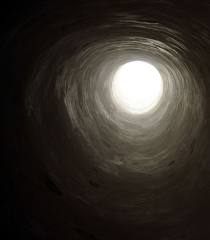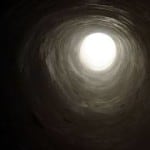The struggles of our forefathers always seem to be entangled in subterfuge and disguises. In the torah portion of Mikeitz ,Joseph begins an intricate subterfuge wherein he accuses his brothers of spying . He sets them up so that they must again face either standing courageously or risking the life of another brother. It is not just any brother but actually it is the only remaining child born to Rachel.
This is not the first instance of camouflage and subterfuge in the text of the book of genesis. Jacob disguises himself as his brother and Leah disguises herself as her sister. Tamar the daughter in law of Judah disguised herself as a harlot and now we meet Joseph hidden behind the disguise of an Egyptian viceroy
It seems that the book which describes the beginning of a people is actually about developing the ability to see beyond the camouflage and to see beyond the covering darkness. This is how that despite the unknown Abraham finds G-d and how Sarah understand the spiritual danger of Ishmael. With that vision Rebecca loves Jacob and fears Esav .It is also how Jacob understands the powerful subtext of Joseph’s life.
That curtain over reality, this darkness, becomes the ultimate obstacle between meeting and relating to G-d and thereby becoming part His ultimate plan. Yet it is a hiddenness that G-d Himself sets into place when He declares “And I will surely hide My face in that day”( Deuteronomy 31:18)
This Divine “hiding” is more than a response to man’s actions in this world but is rather a critical and vital step in the plan for the fashioning of mankind’s purpose.
Hassidic lore tells the story of “Rebbe Reb” Baruch, the grandson of the Baal Shem Tov. “Rebbe Reb” Baruch was himself already a grandfather as he sat studying in the garden. Suddenly his grandson, Yankele, comes bursting into the garden in tears and fell into his grandfather’s arms. “Rebbe Reb” Baruch tried to comfort him and asked Yankele what had happened. Yankele explained that he had been playing a game of Hide and Seek, and nobody came to look for him.
“Rebbe Reb” Baruch smiled and wiped away his grandson’s tears and distress with a sweet candy he pulled out of his pocket.
Several moments later “Rebbe Reb” Baruch’s wife came out to the garden and found her husband in tears. “Baruch what’s wrong…if you’re worried about Yankele. I just saw him playing with his friends,” she said. “Rebbe Reb” Baruch sighed and said, “That’s not it…but I just thought that we know that G-d went into hiding and is expecting us to look for him. So few of us are…and I just realized how sad that is.”
It is that sadness and yearning that sends the searching soul onto its journey. The great spiritual changes in our history are always precipitated by mankind’s innate desire to find what was lost, to discover that which was hidden. It is in fact behind that curtain that man finds his inner strengths .
When the brothers of Joseph arrive in Egypt to garner provisions for their families we read “And Joseph saw his brothers, and he recognized them, but he made himself a stranger to them, and he spoke to them harshly, ” (Ibid 42:7).Essentially, Joseph sets them up so that they must again face giving up or risking the life of another brother. It will become the great challenge for this family as this is not just any brother but Benjamin who is the only remaining child born to Rachel. We see an intricate plan which again pits the sons of Leah against the sons of Rachel. In order for this people to become a people this is a challenge that they must overcome.
That is the lesson of the Chanuka lights as well. On the festival of Chanukah, we celebrate the victory of the small army of Maccabees over the oppressive Greek warlords. It was the victory of the small group of faithful against the large hordes of the faithless. Miraculously, the few overwhelmed the many.
Yet, the focus of the festival of Chanukah seems to highlight the smaller miracle of the jar of oil. The little jar of oil that was found untouched and pure, and that had enough oil to last for one day, lasted, in fact, for the eight days needed to produce more oil. The Maharal asks the question why such emphasis is put on such a wonderful yet small miracle, which is much less impactful than the victory of the few against the many. The military victory represented the end of spiritual and physical domination, while the jar of oil “simply” ensured the continuance of the light.
The military victory, the Maharal explains, was a great miracle. Yet, the source of such a great miracle can usually be confused with military power and tactics. The Divine origins of such a victory can be lost amidst the din of the pompous self- adulation of the victors, G-d used a jar of oil as a signature, to clarify the author of all miracles.
We today, just as the Hellenists in the past can become so enamored of our technical know how and our military prowess, that we can , G-d forbid miss G-d. Joseph too could have been amazed at the power he amassed and the wisdom he possessed, but Joseph’s time in prison had taught him much.
We in our own personal and corporate lives will need to contend with much darkness and much camouflage but when we succeed to survive and pass the test we will come away with an eternal truth. The same truth taught to Zechariah in the haftara read on Chanukah
“This is the word of HaShem unto Zerubbabel, saying:’Not by might, nor by power, but by My spirit,’ saith HaShem of hosts.”

